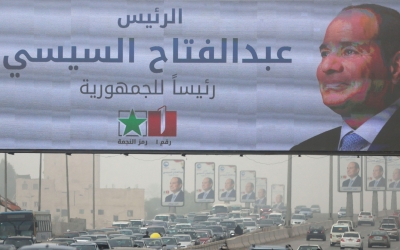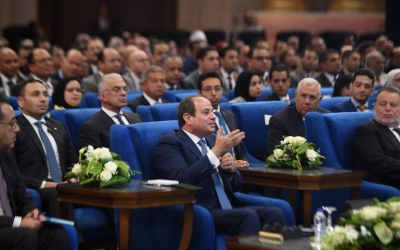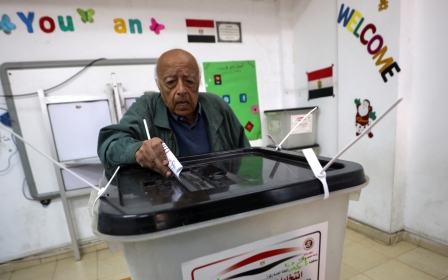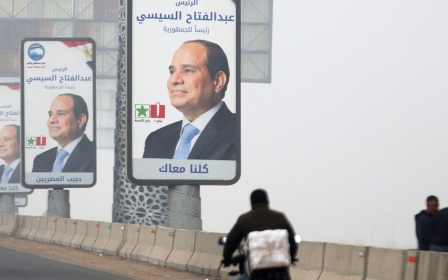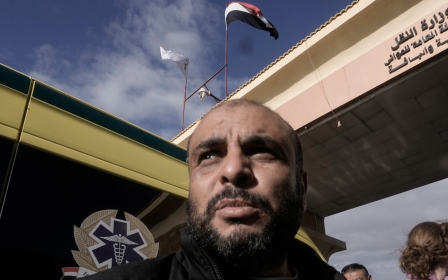Egypt elections marred by voter intimidation and bribes as Sisi prepares for third term
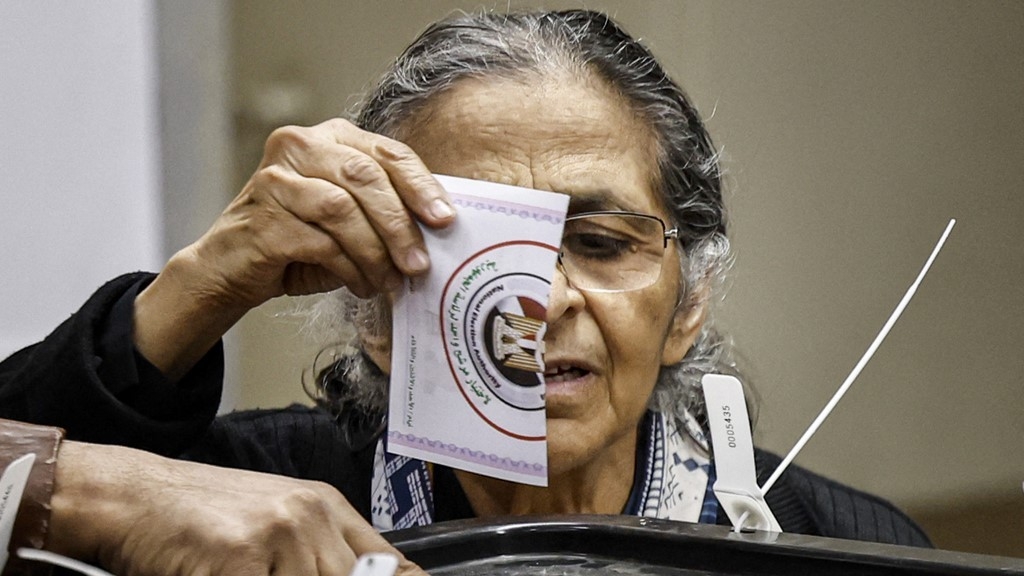
Polls opened for the third and final day of Egypt's presidential elections on Tuesday, with government agencies actively rallying the public to vote for President Abdel Fattah el-Sisi.
The mobilisation efforts, largely involving bribes and intimidation, aim to secure widespread support for Sisi, as a high voter turnout becomes a crucial measure of the incumbent president's popularity in the absence of any significant contenders.
President Sisi is positioned to secure a third term extending until 2030, amid the backdrop of challenging economic conditions and an ongoing conflict on the country's border with Gaza.
The voting took place over three days, between 9am and 9pm local time, with the official results due to be announced on 18 December.
In the Tenth of Ramadan industrial city, on the outskirts of Cairo, a large assembly of workers, donned in both uniforms and civilian attire, gathered on the first day of voting.
Buses owned by their respective factories transported them to the al-Sadat Secondary School for Girls, where they participated in the electoral process, prominently displaying posters of President Sisi.
Outside the school, under heavy military and police guard, three distinct lines were formed, organised by foremen and men in suits who distributed additional Sisi posters.
As a truck affiliated with the pro-Sisi OnTV station passed by, the workers erupted in cheers, chanting "We love you Sisi."
Meanwhile, volunteers from the Nation's Future Party, Sisi's primary parliamentary supporter, captured close-up shots of the assembled workers with cameras. The workers, left standing for an hour and a half, were part of a visibly orchestrated display.
One of them, Hamdeen, a 34-year-old packaging worker, told Middle East Eye that they were ordered to go to vote, and that there were threats that any absences would be punishable by salary cuts.
"We were the first shift, and the second shift will be on the way at 5pm, and the midnight shift will go tomorrow [Monday]," he said. "Our bosses and members of parliament came to talk to TV stations and the press and no one came to talk to us or ask us about what we think."
Samir, a worker from Assiut employed in a snacks factory, echoed similar apprehensions about the voting process.
"We have to follow orders," he told MEE. "Who, in their right mind, would vote for someone who compelled thousands of men to work two, maybe three jobs just to afford a decent life?"
During Sisi's tenure since 2014, Egypt's economy has experienced a notable downturn. The country's debts have more than tripled, and the value of the pound has declined by over half, pushing millions more into poverty.
Religious mobilisation
Meanwhile, senior religious figures and institutions have also taken part in efforts to mobilise the public to vote.
On Friday, the Ministry of Religious Endowments, the government entity responsible for religious discourse in mosques, published the text of the Friday sermons entitle "Positivity", which urged worshippers to vote in the election, asserting that it is a national duty while citing various religious texts to support that.
On Saturday, Minister of Endowments Mohamed Mukhtar Gomaa said in a press conference that voting was a national duty.
In a similar context, Dar Al-Ifta, Egypt's second most important Islamic institution, released a statement urging the public to participate in the elections. "Anyone who abstains from casting his vote in the presidential elections is a sinner according to Islamic law," the statement read.
Since Saturday, pro-government media outlets have published identical reports reminding readers of Law No. 45 of 2014, regarding the exercise of political rights, which specifies a number of penalties related to violations and crimes in the election process.
The law imposed a fine, not exceeding 500 EGP ($16), on anyone whose name was registered in the voter database but failed to vote without an excuse. The same law resurfaces as a warning to the population whenever there is an election in the country, though it is never strictly applied.
Food for votes
In the impoverished area of Al-Warraq Island, dozens of elderly women arrived at the Al-Warraq Secondary School to vote on Sunday after being given papers with their electoral number on it to make voting "easier".
Um Atya, a 56-year-old homemaker, was given the card in front of Nation's Future Party members, and was promised that if she brought it back with confirmation that she voted, she would get a box of food.
'I swear I would have never come here. But what can we do? They threatened my livelihood, and I can not risk it''
- Um Atya
"In other areas, they are giving out 250 EGP [$8] and sugar packets. I prefer the food box. The people will say 'yes' to anything if they are given food. See what they have driven us to!" she said. Um Atya had to stop the interview with MEE as a volunteer approached.
The volunteer, who refused to give a name or a position, told MEE that "everyone in Al-Warraq Island loves Sisi and will vote for him without incentives or money". He refused to comment when asked about food rations being distributed.
In front of the same school, Safaa, 57, a cleaner in Al-Warraq's main hospital, said that she was ordered by her supervisors to go vote or else the day would count as unpaid leave.
"I swear I would have never come here. But what can we do? They threatened my livelihood, and I can not risk it," she said, adding that she did not vote for Sisi but annulled her vote.
"He will win no doubt. We have been seeing this since I was a kid. How can I vote for poverty and humiliation? People are buying bones and chicken legs and some I know are eating from the garbage and buying secondhand food to feed their kids."
Not far from Al-Warraq is the middle-class district of Al-Dokki, in the Agriculture Institute voting station, cameras and reporters were waiting for the Central Bank of Egypt Minister Hassan Abdallah to arrive and vote on Sunday.
A couple in their 60s, Hassan and Ikram, who just came out from the voting station, told MEE: "We voted for Sisi because he is a strong military leader who is up for the challenges that the country is facing, and he is an obstacle to the return of the Muslim Brotherhood."
"There is no other political power that can govern a country as big and complicated as Egypt,” Ikram, a former music teacher in the Higher Institute of Music, told MEE.
In the upscale Garden City neighbourhood, there were reports of shop workers, security guards and cafe waiters being coerced to participate in early morning voting at a nearby school under the threat of police repercussions.
Awadeen, a 40-year-old security guard working in one of the neighbourhood's buildings, disclosed to MEE over the phone that he and at least four others were coerced into voting.
"The officers of the investigation bureau at the police station confiscated our national IDs yesterday [Saturday] and threatened not to return them unless we comply with the voting directive," he explained.
Amid similar reports of voter intimidation and coercion, the fact-checking media outlet Saheeh Masr has been subjected to a government investigation after revealing that the intelligence-owned company United Media has imposed strict regulations on media outlets not to publish content that showed food being distributed to voters or people being transported to polling stations.
'Things are OK and Sisi is good'
In Port Said Street in the Sayida Zeinab working-class area on Sunday, celebrations took place in front of the schools where ballot boxes are.
Young women, children and middle-aged men danced to nationalistic patriotic songs played on a TV station outside the school, as dozens of volunteers from the "Be positive and Vote" campaign distributed flyers to passing cars and gave out Egyptian flags to elderly voters.
One of the volunteers, Usama, a 19-year-old mass communications student in the Sixth October private university, said that he and others are encouraging locals to go vote.
'We have to endure some hardships so that our country lives in peace and prosperity'
- Usama, pro-Sisi volunteer
"Some Egyptians are illiterate or rather unaware of their rights and obligations, so it is our role as the new generation to show them what is right."
As Usama's colleagues danced and cheered on the back of a car with a Sisi poster, he said: "I personally voted for Sisi because of all of the projects that he has launched in the past years and because he protected the country."
In the same line where Usama was handing out flags, Said Al-Amin Saleh, a 67-year-old pensioner, said that he was transported from his house to the ballot station by the Nation's Future party, and promised a meal and a Coke in exchange for his vote.
Asked about whether the economic status of the population and increasing prices would affect the voting, Saleh told MEE: “We have to endure some hardships so that our country lives in peace and prosperity. Look around you, everyone is buying fast food and iPhones. Things are OK and Sisi is good."
"Stability and peace are the most important things that we are voting for," Saleh added. "Look at Libya, Gaza and Sudan, they are in civil war and [facing] terrorism."
Middle East Eye propose une couverture et une analyse indépendantes et incomparables du Moyen-Orient, de l’Afrique du Nord et d’autres régions du monde. Pour en savoir plus sur la reprise de ce contenu et les frais qui s’appliquent, veuillez remplir ce formulaire [en anglais]. Pour en savoir plus sur MEE, cliquez ici [en anglais].


